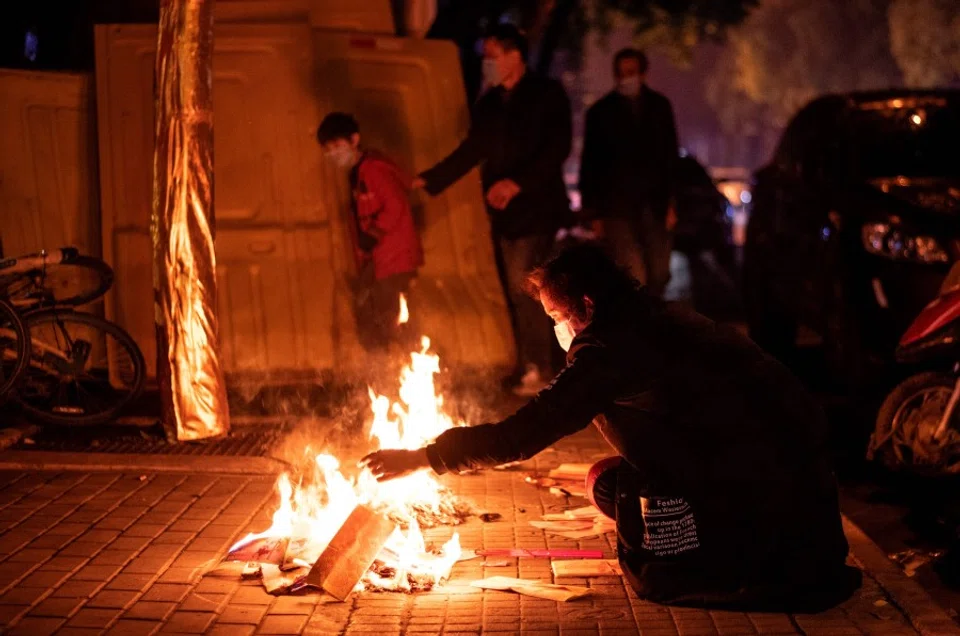Families in Wuhan want accountability from those who covered up outbreak
With the lockdown on Wuhan about to be lifted on 8 April and the annual Qingming Festival just over, families in Wuhan are coming to terms with their losses. They want accountability from those who covered up the initial outbreak, even as they deal with the psychological impact of the coronavirus and lockdown.

Zhang Yong (pseudonym) does not know how to face the first Qingming Festival - where Chinese people traditionally pay respects to the deceased - following his father's passing. Many stores in Wuhan remain shut, and he has not been able to prepare the necessary memorial candles or display a suitable photograph, but has had to use a travel photo of his father and light three cigarettes to mourn him.
"If those experts and officials hadn't said that the virus was under control and could not be transmitted between humans, I would never have sent my father back to Wuhan." - Zhang Yong
After Zhang's father passed away in February from Covid-19, he changed his WeChat handle to remind himself of the date. He told Zaobao that he brought his father to live with him in Guangdong about a year ago. In January this year, his father suffered a fracture and Zhang sent him to Wuhan for treatment, thinking that the medical facilities were better there, only for the 76-year-old to contract Covid-19 and pass on 15 days later.
Even over the phone, Zhang could not hide his guilt and anger. "If those experts and officials hadn't said that the virus was under control and could not be transmitted between humans, I would never have sent my father back to Wuhan," he said."Now, I live in regret every day. I just want an explanation from those people who covered up the outbreak."
Qingming may trigger secondary psychological crisis
According to official figures, about 2,500 people have died from the virus in Wuhan. For the thousands of families who have lost loved ones like Zhang Yong, this year's Qingming Festival is an especially difficult psychological challenge as they face the pain of their losses. Not knowing what to do with their lives following the lifting of the lockdown, they also find it difficult to forgive the officials who covered up the outbreak.
Psychologists noted that Qingming might trigger a secondary psychological crisis, which if not handled properly might spread through the country, and possibly lead to some people taking extreme action, such as ending their own lives or lashing out at society.

Psychological consultant Liu Yifan said, as a traditional festival where people remember and pay respects to their ancestors, Qingming can easily trigger mass grief and stir the emotions that people have been suppressing for months. The residents of Wuhan, the epicentre of the outbreak, and especially the families of those who died from the virus, should be given social support to help them out of their grief.
"I won't rest easy if I don't get an explanation from them. I wouldn't be able to face my father when I die." - Zhang Yong
On 4 April, China held a national day of mourning for the healthcare workers and ordinary people who died from the virus. Tan Gangqiang, head of a psychology consultation center in Chongqing (重庆市协和心理顾问事务所), said while this shows that the Chinese government is attaching great importance to the first Qingming following the outbreak, it must not be just propaganda for fanning emotions. The authorities have to take concrete measures to resolve societal problems, track down those who covered up the outbreak and provide living and employment assistance to disadvantaged families.
Zhang Yong and many families of deceased patients find it hard to let go of the local government's mismanagement of the initial outbreak and the lack of concern for patients and their families. Zhang has joined a chat group with over 100 family members of deceased patients, and has found similar experiences among them: workplaces did not offer help while patients were ill, and "tried all ways and means to shut up family members " after the patients died.
"The people at my father's workplace never said anything while he was in the hospital. After he died, they threatened me and said someone from his workplace would come with me to collect his ashes, and to make sure we bury him immediately." Zhang said, his voice trembling. "I haven't collected the ashes because I don't want to be under their control. I won't rest easy if I don't get an explanation from them. I wouldn't be able to face my father when I die."
Tan Gangqiang said the mental strain suffered by family members of deceased patients does not only come from the grief of losing loved ones, but also reflects their resentment at the rough handling of the situation. To soothe their feelings, the government needs to ease rather than block its expression, by offering support and care through grassroots and the community.
Tan said, "If the government allows people to give vent to their feelings appropriately and resolves the problems raised, survivors can turn their grief into strength. Otherwise, negative emotions might be triggered and amplified. Those affected might become depressed or anxious. They might lose hope in living, or even vent their personal frustrations by lashing out at society."
Ordinary people facing new psychological challenges
Even if people have not lost their loved ones, Wuhan residents have endured tremendous psychological pressure over the two months of lockdown. Qingming signals the end of the lockdown and many people would have just come away from its trauma. Yet they would immediately find themselves face-to-face with the apprehension and insecurities about their future.
In mid-January, 26-year-old Wuhan resident Chen Zhi went with her parents to the outskirts of the city to pay respects to their ancestors. They were locked out of the city soon after and had to stay in the outskirts for a number of days. During this period, Chen faced a novel problem: having nothing to do in the day, while feeling anxious and sleepless at night. "I just kept reading the news every day. I wasn't in the mood to do anything else," she said. "My pulse would go up for no reason."

Chen eases her anxiety by chatting with friends online, and as the outbreak in Wuhan comes under control, her condition has improved. But going out of the house renews her fear. She said, "I heard that someone took a ride on the Metro and their health code* went from green to red, which shows there may have been a patient in the same cabin. Even though everyone wears masks, I feel uncomfortable. I probably won't be going out anytime soon."
Liu explained that after a long lockdown, many people would need time to adjust to normal life again. He said, "Some people adjust quickly, while others need more time. That is normal. But if meeting people triggers strong physical reactions such as increased heart rate or even nausea, they need to promptly seek help with a psychological consultant."
"... everyone who has gone through this pandemic would need some degree of psychological help." - Psychological consultant Liu Yifan
He added that as Wuhan moves to lift the lockdown, three groups of people, in particular, might show psychological distress. First, employees who may find it difficult adjusting to work again after two or three months away. Second, parents who are anxious about their children's studies as schools remain closed. Third, the elderly facing empty nests, as their children go back to work.
Furthermore, while the pressure on the frontline healthcare workers, police, and delivery workers may be easing, the psychological burden built up from working under high pressure might just be about to show. Liu said, "In fact, everyone who has gone through this pandemic would need some degree of psychological help. People can search online for mental courses related to emotional adjustment, depression, and trauma, to better understand their own psychological needs."
* The "Wuhan health code" kicked in during the epidemic. People scan a barcode in place of filling in a form that reflects their current state of health (green = clear) and enables the authorities to trace their whereabouts if necessary.



![[Photos] Fact versus fiction: The portrayal of WWII anti-Japanese martyrs in Taiwan](https://cassette.sphdigital.com.sg/image/thinkchina/3494f8bd481870f7c65b881fd21a3fd733f573f23232376e39c532a2c7593cbc)

